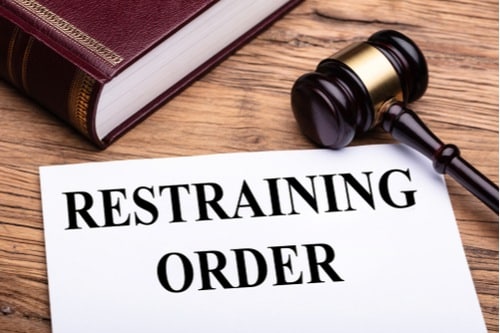When someone accuses you of domestic violence in South Carolina, you can face a restraining order without the opportunity to defend yourself in court. While domestic violence cases do need to be taken very seriously, the way these cases are handled unfortunately means that many people receive unwarranted restraining orders—in some cases without their knowledge.
If you have been accused of violating a restraining order in South Carolina, you need to handle your situation carefully. Restraining order violations can have severe consequences, especially in cases of domestic violence. Please keep reading to learn what you need to know, then contact us for a free and confidential consultation with North Charleston defense attorney Rad S. Deaton.
What Constitutes a Restraining Order Violation?
When you receive a restraining order in South Carolina, the order will state specifically what you aren’t allowed to do. If you do any of these things—intentionally or unintentionally—you can be charged with a restraining order violation. Domestic violence restraining orders can contain several different types of prohibitions, including those against:
- Having any contact with the alleged victim
- Coming within a certain distance of the alleged victim’s home, school, or place of work
- Threatening the alleged victim or any of the alleged victim’s family members
- Returning to a residence shared with the alleged victim
- Possessing firearms or ammunition
Temporary restraining orders—those issued immediately in response to domestic violence allegations without the alleged abuser’s presence—typically remain in effect for 15 days. If you are subject to a final restraining order, this restraining order could be in effect for between six months and a year, and the alleged victim may be able to have the order extended as well. In other words, restraining orders can take effect immediately, and they can last for a very long time. Engaging in prohibited conduct at any time while a restraining order is in effect can result in prosecution for a restraining order violation.
What are the Consequences of Violating a Restraining Order in South Carolina?
Violating a restraining order is a criminal offense in South Carolina. Even if you have been wrongfully accused of domestic violence, you can still face steep penalties for violating an order that a judge has entered against you.
The penalties for restraining order violations in South Carolina vary depending upon the specific circumstances involved. The possibilities include:
- Violating a Temporary Restraining Order – If you violate a temporary restraining order in South Carolina, you can face a $500 fine and up to 30 days in jail.
- Violating a Permanent Restraining Order – If you violate a permanent restraining order in South Carolina, you can face up to a $1,500 fine and 12 months in jail.
- Violating a Restraining Order By Visiting a Domestic Violence Shelter – If you violate a restraining order by visiting a domestic violence shelter where the alleged victim is currently residing, you can face fines and up to three years of incarceration.
- Violating a Restraining Order with a Dangerous Weapon – If you violate a restraining order in South Carolina with a dangerous weapon, you can face fines and up to five years of incarceration.
Violating a restraining order can potentially have other consequences as well. For example, if you are in a custody dispute, being convicted of a restraining order violation could negatively impact your efforts to obtain custody or visitation. Additionally, with a criminal conviction on your record, you may find it much more difficult to get work, get a home loan or an apartment, and enjoy certain other privileges. If you are in the military, a criminal conviction for a restraining order violation may impact your service as well.
How Do You Defend Against an Alleged Restraining Order Violation?
Given the severe consequences of a conviction, if you have been charged with violating a restraining order, you need to defend yourself by all means available. The defenses you can assert will depend on the specific facts of your case. With this in mind, possible defenses to allegations of restraining order violations in South Carolina include:
You Have Been Falsely Accused
It is not uncommon for individuals to be falsely accused of violating domestic violence restraining orders. If you have been falsely accused, you certainly do not deserve to be convicted. There are several possible ways to prove false allegations in these cases, and you will want to talk to a defense attorney promptly to figure out what options you have available.
You Have an Alibi
If you did not violate your restraining order, you might be able to prove it by establishing an alibi. This involves proving that you were somewhere else when you supposedly committed the violation. Employment records, photographs, social media posts, testimony from friends and family, and GPS data are just some of the types of evidence that can be used to establish an alibi.
Lack of Admissible Proof
While proving that you are innocent is one option, all you need to do is prevent the prosecution from proving that you are guilty. If you can show that the prosecution lacks the evidence it needs to prove your guilt beyond a reasonable doubt, then you can avoid a conviction for a restraining order violation.
Seeking Reduced Penalties
Finally, if you violated your restraining order and the prosecution has the evidence it needs to prove it, then you may need to focus your defense strategy on seeking reduced penalties. An experienced defense attorney will be able to use the facts of your case to seek as much leniency as possible.
Talk to North Charleston Defense Lawyer Rad S. Deaton for Free
Have you been accused of violating a restraining order in South Carolina? If so, you should speak with a defense lawyer right away. To request a free and confidential consultation with North Charleston criminal defense lawyer Rad S. Deaton, call 843-225-5723 or tell us how we can reach you online now.






